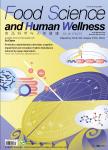Plant natural products as effective options for inhibiting foodborne pathogens: A comprehensive review of their activities, mechanisms, and applications in food preservation
作者机构:College of Food Science and Technology, Yunnan Agricultural University School of Public Health, Dali University Editorial Department of Journal of Yunnan Agricultural University
出 版 物:《Food Science and Human Wellness》 (食品科学与人类健康(英文))
年 卷 期:2024年
核心收录:
学科分类:08[工学] 082203[工学-发酵工程] 0822[工学-轻工技术与工程]
基 金:financially supported by the National Natural Science Foundation of China (32060520) Science and Technology Talents and Platform Program of Yunnan Province, NO. 202105AF150049 University Key Laboratory of Food Microbial Resources and Utilization in Yunnan Province (Yunjiaofa No.135)
摘 要:In order to ensure food safety, controlling foodborne pathogen contamination is of utmost importance. Growing apprehensions regarding the safety of synthetic antimicrobials, due to their adverse health effects, have prompted a search for alternative options. Plant natural products (PNPs) with antimicrobial activity are being explored as a viable alternative. Among the various antimicrobial natural products studied, plant essential oils, plant flavonoids, plant polyphenols, plant polysaccharides, and plant antimicrobial peptides have been identified as potential candidates. PNPs demonstrate a diverse array of antimicrobial mechanisms, encompassing cell wall and membrane damage, interference with genetic replication, disruption of energy metabolism, and induction of oxidative stress at the single-cell level, as well as inhibition of biofilm formation and quorum sensing at the population level. Certain PNPs have been harnessed as natural antimicrobial agents for the food preservation. The utilization of encapsulation technology proves to be an effective strategy in protecting PNPs, thereby ensuring good antimicrobial efficacy, enhanced dispersibility, and controlled release within food products. The utilization of nanoemulsions, nanoliposomes, edible packaging, electrospun nanofibers, and microcapsules formed by encapsulation has enriched the ways in which PNPs can be applied in food preservation. Although PNPs have great potential in food preservation, their widespread application in the food industry is currently constrained by factors such as production costs, safety concerns, and legal considerations. Chemical synthesis and biosynthesis pathways offer viable strategies for reducing the cost of producing PNPs, and ongoing efforts to assess safety and improve regulatory frameworks are likely to facilitate the broader adoption of PNPs in food preservation practices. This article provides an overview of the main types of PNPs with antimicrobial activity and their prope



